Copyright
©2014 Baishideng Publishing Group Inc.
World J Biol Chem. Aug 26, 2014; 5(3): 355-376
Published online Aug 26, 2014. doi: 10.4331/wjbc.v5.i3.355
Published online Aug 26, 2014. doi: 10.4331/wjbc.v5.i3.355
Figure 2 Roles of matrix metalloproteinases in cancer progression.
The matrix metalloproteinases (MMPs) play complex but important roles during different stages of cancer progression. A and B: Growth and survival. MMP modulates cellular growth by cleaving different cellular components. It promotes cellular growth by releasing IGF from insulin growth factor-binding protein (IGF-BP). MMP-7 promotes cell survival by resisting apoptosis through cleaving Fas ligand (FasL). MMP modulates integrin signalling by regulating the extracellular matrix (ECM), which regulates growth. MMP activates transforming growth factor-β (TGF-β) from its latent TGF-β complex, which plays important roles in tumour development; C: Angiogenesis. MMP promotes angiogenesis through recruitment of VEGF, FGF. Angiogenesis is further promoted by degradation of extracellular component like collagen I, IV, fibrin, etc., which also act as pro-angiogenic factors; D: Invasion and epithelial to mesenchymal transition (EMT). MMP modulates invasion by degrading specific cellular components, including E-cadherin and CD-44. MMP is involved in mesenchymal transition through cleavage of E-cadherin and modulating TGF-β signaling. MMP-3 is directly involved in EMT, whereas MMP-9 has roles in differentiation; E: Inflammation and immune surveillance. MMPs also regulate immune reactions against the cancer cells. MMP-mediated TGF-β activation inhibits T lymphocyte proliferation. MMPs also modulate cancer-cell sensitivity to natural killer cells and leukocyte accumulation by cleaving different chemokines and cytokine families. VEGF: Vascular endothelial growth factor; FGF: Fibroblast growth factors.
- Citation: Verma S, Kesh K, Ganguly N, Jana S, Swarnakar S. Matrix metalloproteinases and gastrointestinal cancers: Impacts of dietary antioxidants. World J Biol Chem 2014; 5(3): 355-376
- URL: https://www.wjgnet.com/1949-8454/full/v5/i3/355.htm
- DOI: https://dx.doi.org/10.4331/wjbc.v5.i3.355









